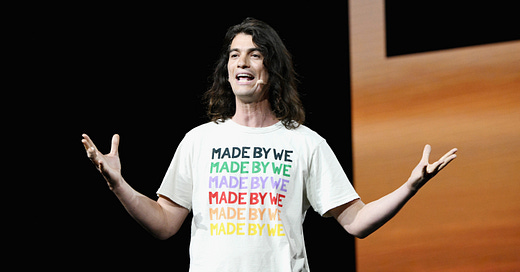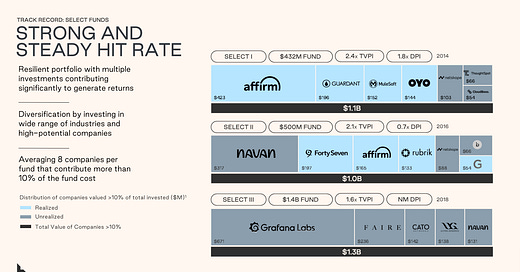
Can a Zebra Change Its Stripes?
Silicon Valley is puzzling over Marc Andreessen's decision to back Adam Neumann's new startup Flow.
As I’m sure you’ve heard by now Andreessen Horowitz announced Monday that it’s cutting its largest individual check ever — $350 million — in WeWork founder Adam Neumann’s new real estate company Flow. Andreessen Horowitz co-founder and Netscape internet icon Marc Andreessen is leading the deal and taking a board seat. (Andreessen Horowitz previously led a $70 million investment in Flowcarbon, a crypto company tied to Neumann.)
I spent Monday checking in with sources to see what they know and puzzling over the Flow investment. When I asked rival investors whether they kicked the tires on Flow, I received answers like “hahaha” and “No — it’s good to know there’s still a place for utter insanity though.”
This is not a deal that would get done in a world where an iron-fisted cabal of investors could blacklist founders from ever raising capital again. Plenty of icons got burned by Neumann: JPMorgan’s Jamie Dimon and SoftBank’s Masayoshi Son to name two.
Even though Benchmark made money off WeWork, it’s obvious to anyone who has watched WeCrashed that the venture firm has a dim view of Neumann these days.
So if you’ve made an enemy out of Benchmark, where better to go raising money than Andreessen Horowitz. After all, Andreessen once said about Benchmark’s Bill Gurley, “I can’t stand him,” and described Gurley as the Newman to his Jerry Seinfeld.
Now Andreessen has found a Neumann that’s sure to irk his Newman.
Benchmark isn’t the only investor that walked away with a poor view of Neumann. One former WeWorker investor marveled at Andreessen’s decision to invest in the WeWork founder. “That is a lot of money to entrust with Adam Neumann. I certainly wouldn’t have done that.”
This person said about Neumann, “I’m sure he’s humbled and learned lessons — all that. But his personality and the way he does things, and the way he lives his life is — I find it hard to believe a zebra changes his stripes.”
Then mockingly, this investor said, “You never know maybe he had a spiritual enlightenment.”
Most everyone I talk to outside of Andreessen Horowitz is puzzled by the decision to invest. One insider mused, “Are they doing this just to troll all of us because they just don’t care? Backing him is one thing. But they didn’t have to make it their biggest investment ever.”
As a sort of scholar of Andreessen Horowitz thinking, I find the troll theory of the case fairly compelling. This whole saga has been great strategic positioning for the firm. What Andreessen Horowitz has always understood better than anyone else is that the main audience for their marketing is founders. So even if the masses find investing in Neumann distasteful, this sends a clear message to prospective founders that a16z wants to back the bold. And founders are the ones who can generate the billions in returns for Andreessen Horowitz that the firm needs to be successful.
This is the contrarianism that is so often talked about.
(Of course, it is also a sort of amoral nihilism.)
One Silicon Valley insider observed, “It sends an f-you message to the press — your reporting didn’t really matter and a message to founders that they’ll always be supported.”
With Andreessen writing the checks, people need not be accountable for their actions.
And there is a reality that “bad” founders can learn from their mistakes.
In fact, one of the most compelling Silicon Valley redemption arcs has involved a former Andreessen Horowitz founder. The firm ousted Parker Conrad from Zenefits only to watch Kleiner Perkins, Founders Fund, and Sequoia Capital invest in Conrad’s subsequent company, Rippling. Valued at $11.25 billion in May, Rippling is worth more than Zenefits ever was.

I also agree with rival investors who believe that Andreessen Horowitz has a lot of money to deploy and this is a way to invest a lot of money at once. That’s one of the things that drew SoftBank to Adam Neumann in the first place. SoftBank needed a founder who could spend SoftBank’s billions. Now Andreessen Horowitz finds itself in the same situation. The firm is investing out of more than $12 billion — across venture, growth, crypto, bio, gaming, and its seed fund. All that money has got to go somewhere and what is more cash consumptive than a real estate business with Adam Neumann at the helm?
The former WeWork investor said about Andreessen, “To me this feels like a fund manager that raised too big of a fund got together with a founder who had a very good story to tell.”
Much has already been made of Andreessen’s hypocrisy on housing policy, opposing development in Atherton while opening his blog post about the Flow investment by saying, “Our nation has a housing crisis.”
Investor Mitch Kapor quipped on Twitter, “Do as I say not as I do.”
Andreessen Horowitz has been very open that “American Dynamism” is a core part of its strategy and so investing in a real estate business seems to be part of that.
My personal view here is that I think it’s disappointing when venture capitalists abandon the venture model. The beauty of venture capital investing is that it’s staged. Start off with a small, high-risk bet and then invest more over time based on performance. As the risk goes down, deploy more money. I could understand giving Neumann another shot — he has a lot of strengths — but to write the firm’s biggest individual check ever just seems ridiculous.
There have been cases where big early checks worked out for investors — Jet and Nest come to mind. But in both cases those companies were scooped up in acquisitions. Walmart wanted Jet CEO Marc Lore to help it compete with Amazon and Google wanted some of that Apple sheen from Tony Fadell. What company is going to go to their board of directors and say we really need to recruit Neumann to start wreaking havoc?
So then, it would seem that Flow is playing for keeps here. They have to build a real, sustainable business. And putting aside all Neumann’s other faults, he never got close with WeWork. The business lost oodles of money. WeWork is worth just $4 billion today.
Marc Andreessen has always seemed to have an affection for founders who lost other people’s money. He was long a defender of Elizabeth Holmes.
You have to wonder if she’ll be getting a call next.

















Marc Andreesen has what my old boss used to call a “move the needle” problem ... the more you have in assets, the more it takes to move the needle. That can make you do some very strange things. Buffet has the same problem but Buffet has the discipline (and freedom due to the fund structure) to just stay in cash for extended periods of time, and just be patient. Once you have a move the needle problem and if you get desperate enough, you might find yourself buying lottery tickets, which is what might be happening here. Given his history, I wouldn’t trust Neumann a dime even if he had a bullet-proof business - but hey, I don’t have quite the same “move the needle” problem either, so what do I know!
"All that money has got to go somewhere and what is more cash consumptive than a real estate business with Adam Neumann at the helm?" 👏👏👏